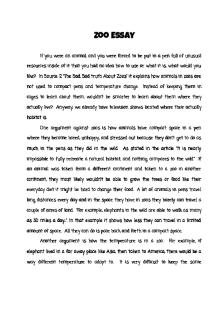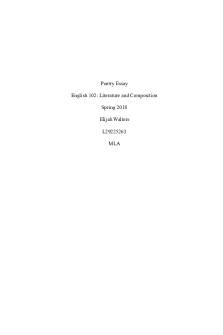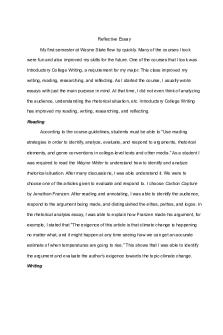Accounting Essay - Grade: B PDF

| Title | Accounting Essay - Grade: B |
|---|---|
| Author | Ashleigh Burtenshaw |
| Course | Financial Accounting |
| Institution | Bath Spa University |
| Pages | 9 |
| File Size | 357.4 KB |
| File Type | |
| Total Downloads | 54 |
| Total Views | 195 |
Summary
Download Accounting Essay - Grade: B PDF
Description
2/2/2017
A Critical Evaluation on the Adoption of the International Accounting Standards Assessment 1 – Individual Essay
Student ID - 303746 BATH SPA UNIVERSITY
Student ID – 303746
Word Count - 1006
Contents Page
1. Introduction……………………………………….2 2. A Critical analysis on the advantages of the International accounting standards…..2-3 2.1. Political and Economic Benefits……........……………………………..2-3 2.2. Financial Benefits…………………..3 3. A Critical analysis on the disadvantages of the International accounting standards…………………………………………..3-4 3.1. Political Developments………..…3 3.2. Individual Differences in countries ……………………………..………………………3-4 3.3. Financial Issues………………………4 4. Conclusion……………………………….............4 5. References………………………………………...5 6. Reference Log…………………………………...6-8
1
Student ID – 303746
Word Count - 1006
Question - “Critically evaluate the adoption of international accounting standards (IAS and IFRS) by UK companies”
1. Introduction Since 1973 the International Accounting standards Committee established the International Accounting standards (IAS), a single set of regulations which is used as a benchmark for the development of accounting rules globally. Since April 2001 the committee changed their structure to become a board (IASB), then they adapted the IAS into the International Financial Reporting Standards (IFRS). The only difference being if any rules contradict with each other, the IAS policies are the ones which are disregarded in favour of the IFRS [ CITATION Dav11 \l 2057 ]. The objective of the standard is as follows “To develop a single set of high quality, understandable, enforceable and globally accepted financial reporting standards based upon clearly articulated principles.” [ CITATION Cra17 \l 2057 ]. Companies within the UK have the choice between the IFRS or the UK GAAP, the generally accepted accounting practices, but it is mandatory for a company to comply with at least one. The new 2013 UK GAAP is based upon the IFRS but is predominately for small companies [ CITATION Gov16 \l 2057 ].
2. A Critical analysis on the advantages of the International accounting standards 2.2. Political and Economic Benefits In terms of political reasons, the IAS is highly beneficial to make trading with countries easier. The use of a single standard results in lower capital and international reporting costs [ CITATION Cra17 \l 2057 ]. Furthermore, this will encourage globalisation for countries who have adopted the IAS. Chairman of the IASB, Sir David Tweedie expressed how the IAS “breaks down barriers to investment and trade”, this will stimulate economic growth [ CITATION Dav11 \l 2057 ]. It is likely a country will adopt the IAS if trade partners also have the standards, for the UK this is applicable and the simplicity of the standard as a universal language allows high quality trading to benefit all countries involved
2
Student ID – 303746
Word Count - 1006
[ CITATION Ram09 \l 2057 ]. Tweedie’s comments were stated in 2004, since then severe political developments have occurred, questioning whether his statement is still relevant now. Continuously the economic benefits presented is the efficiency the IAS allows UK companies to be when identifying risks or opportunities across the world, making the capital allocation more efficient [ CITATION Cra17 \l 2057 ]. PWC, a UK company, has expressed its support for the IFRS in terms of its economic benefits, as a company that also advises and helps other UK companies we can expect that others share their same views [ CITATION PWC13 \l 2057 ].
2.3. Financial Benefits Financially the adoption of the IAS benefits the UK, a study conducted with the top 80 UK companies in the FTSE 100 saw a positive difference in the probability and gearing ratios. Resulting in a higher quality financial situation for UK businesses [ CITATION Sov15 \l 2057 ]. On the other hand, some critics state that the IAS has created a culture in which banks could give themselves high bonuses and unmerited dividends, presented when the financial crisis in 2009 occurred [ CITATION Jon13 \l 2057 ]. Banks took advantage of the predicted success and the IAS was not accurate in predicting the risk of certain investment proposals, leading to the 2009 recession. The data in the Sovbetov study is recent being in 2015, whereas the critics in financial times was 2013, significant changes have occurred in those years, discrediting comments in the latter’s arguments.
3. A Critical analysis on the disadvantages of the International Accounting Standards 3.1. Political Developments Brexit has been a catalyst in the doubt of IAS. The UK leaving the EU has resulted in uncertainty for the long term when using IAS due to differences in trading laws. This uncertainty makes the simplicity and ability to take risks on economic decisions difficult, creating issues for the UK if they continue to use the IAS [ CITATION EY16 \l 2057 ]. However, in the short term there are to be no immediate changes, which gives the UK time to monitor developments in the IAS since Brexit [ CITATION EY16 \l 2057 ].
3.2. Individual Differences in Countries
3
Student ID – 303746
Word Count - 1006
Each country can choose which standards they wish to enforce, France voted to allow the wine industry to avoid certain IFRS regulations to benefit this industry [ CITATION Cra17 \l 2057 ]. These variations in what is adopted could lead to a drop in efficiency when comparing data or trading figures due to the IAS varying from each country. A UK business may view an industry as positive to invest into but soon discover that with the changes in IAS in that country it’s a much higher risk than expected. Businesses are also not transparent due to not disclosing information that is expected when adopting the IAS, questioning its efficiency as a comparative tool. However, a 2011 study revealed that research and development rules due to the IAS in most industries across the EU benefited UK companies, by being cost effective and productive [ CITATION Tso11 \l 2057 ]. Nevertheless, there is no punishment to not complying with the IFRS, leading to a likelihood of countries adapting the standards to what suit their thriving industries which could create trading issues with the UK [ CITATION Cra17 \l 2057 ].
3.3. Financial Issues When the IFRS is updated, new regulations are implemented and need to be complied with. This creates a large initial cost for companies, more so if it is continuingly changing, meaning the costs are frequent. For small businesses in the UK this is not efficient as they can’t keep up with the new rules and the high costs. Causing many companies to adopt the UK GAAP, as it’s more practical for SME’s [ CITATION Hal13 \l 2057 ]. However, Sovbetov, 2015, explains how the costs are usually paid back within the first three years of IAS implementation due to the benefits of the IFRS on companies [ CITATION Sov15 \l 2057 ].
4. Conclusion Overall, the benefits outweigh the disadvantages, there is a higher standard of recent and relevant data that supports the IAS’ objectives of being “high quality and understandable”. However as mentioned it isn’t enforced well enough as no punishment is given to countries who don’t abide by the regulations, not completing the objectives. As an accounting system, the IAS is highly efficient to compare and make rational economic decisions benefiting the UK. Compared to other standards such as UK GAAP there are reasons for both, in terms of large UK companies creating a lot of the economy for the UK the IAS is the most appropriate standard to follow for economic success.
4
Student ID – 303746
Word Count - 1006
References Crawford, I., 2017. International standards in financial reporting. Bath Spa University: s.n. Davies, T. & Crawford, I., 2011. UK Accounting and financial reporting standards. In: F. T. P. Hall, ed. Business Accounting and Finance. Harlow: Pearson, pp. 14-18. EY, 2016. Applying IFRS - Heading for Brexit. [Online] Available at: http://www.ey.com/Publication/vwLUAssets/Apply-Overviews-BrexitJuly2016/$FILE/Apply-Overviews-Brexit-July2016.pdf [Accessed 4 February 2017]. Gov.uk, 2016. Accounting for corporate finance: International Financial Reporting Standards (IFRS). [Online] Available at: https://www.gov.uk/hmrc-internal-manuals/corporate-finance-manual/cfm20020 [Accessed 29 January 2017]. Haller, A. & Wehrfritz, M., 2013. The impact of national GAAP and accounting traditions on IFRS policy selection: Evidence from Germany and the UK. Journal of International Accounting, Auditing & Taxation, 22(1), pp. 39-56. Jones, A., 2013. UK looks to counter IFRS rules critics. [Online] Available at: https://www.ft.com/content/e04478b2-2c3f-11e3-8b20-00144feab7de [Accessed 3 February 2017]. PWC, 2013. New UK GAAP or IFRS? Your Questions Answered. [Online] Available at: http://www.pwc.com/im/en/publications/assets/new_uk_gaap_or_ifrs.pdf [Accessed 2 February 2017]. Ramanna, K. & Sletten, E., 2009. Why do countries adopt International Financial Reporting Standards?, Cambridge: Harvard Business School. Sovbetov, Y., 2015. How IFRS Affects Value Relevance and Key Financial Indicators? Evidence from the UK. International Review of Banking, Acounting and Finance, 7(1), pp. 73-96. Tsoligkas, F. & Tsalavoutas, I., 2011. Value relevance of R&D in the UK after IFRS mandatory implementation.. Applied Financial Economics, 21(13), pp. 957-967.
5
Student ID – 303746
Word Count - 1006
Reference Log Book Chapter Titles/Page Date
Reference Name 1. Crawford, I., 2017. International standards in financial reporting. Bath Spa University: s.n.
Accessed 1st February 2017
2. Davies, T. & 29th Crawford, I., 2011. January UK Accounting and financial reporting 2017 standards. In: F. T. P. Hall, ed. Business Accounting and Finance. Harlow: Pearson, pp. 14-18. 3.EY,2016. Applying IFRS Heading for Brexit. [Online] Available at: http://www.ey.com /Publication/vwLU Assets/ApplyOverviews-BrexitJuly2016/$FILE/Ap ply-OverviewsBrexit-July2016.pdf [Accessed 4 February 2017].
4th
4. Gov.uk, 2016. Accounting for corporate finance: International Financial Reporting Standards (IFRS).
29th
February 2017
January
URL or Third Party
numbers and library reference
Ian Crawford delivered a lecture on the IAS at Bath Spa University on 11th January 2017 to use for students within this assignment.
N/A
http://eds.a.ebscohost.com.bathspa.id m.oclc.org/eds/detail/detail? vid=2&sid=87cacb2b67df426e9ee11a 7f16cb5bdb %40sessionmgr4006&hid=4210&bdat a=JkF1dGhUeXBlPWlwLHNoaWImc2l0 ZT1lZHMtbGl2ZQ%3d %3d#AN=bs.a2112447&db=cat00939a
Library reference -658.1511 DAV Chapter Title – UK Accounting and financial reporting standards Page numbers: 1418
http://www.ey.com/Publication/vwLU N/A Assets/Apply-Overviews-BrexitJuly2016/$FILE/Apply-OverviewsBrexit-July2016.pdf
https://www.gov.uk/hmrc-internalmanuals/corporate-financemanual/cfm20020
2017
6
N/A
Student ID – 303746
Word Count - 1006
[Online] Available at: https://www.gov.u k/hmrc-internalmanuals/corporate -financemanual/cfm20020 [Accessed 29 January 2017]. 5. Haller, A. & 4th January Wehrfritz, M., 2017 2013. The impact of national GAAP and accounting traditions on IFRS policy selection: Evidence from Germany and the UK. Journal of International Accounting, Auditing & Taxation, 22(1), pp. 39-56. 6. Jones, A., 2013. UK looks to counter IFRS rules critics. [Online] Available at: https://www.ft.co m/content/e04478 b2-2c3f-11e38b2000144feab7de [Accessed 3 February 2017]. 7. PWC, 2013. New UK GAAP or IFRS? Your Questions Answered. [Online]
3rd February
http://eds.a.ebscohost.com.bathspa.id Journal Pages: 39-56 m.oclc.org/eds/detail/detail? vid=6&sid=87cacb2b-67df-426e-9ee11a7f16cb5bdb %40sessionmgr4006&hid=4210&bdat a=JkF1dGhUeXBlPWlwLHNoaWImc2l0 ZT1lZHMtbGl2ZQ%3d %3d#AN=86465406&db=bth
https://www.ft.com/content/e04478b N/A 2-2c3f-11e3-8b20-00144feab7de
2017
2nd February
http://www.pwc.com/im/en/publicati ons/assets/new_uk_gaap_or_ifrs.pdf
2017
Available at: http://www.pwc.co m/im/en/publicati ons/assets/new_uk _gaap_or_ifrs.pdf [Accessed 2 7
N/A
Student ID – 303746
Word Count - 1006
February 2017]. 8. Ramanna, K. & 6th Sletten, E., 2009. February Why do countries adopt International 2017 Financial Reporting Standards?, Cambridge: Harvard Business School. 9. Sovbetov, Y., 2015. How IFRS Affects Value Relevance and Key Financial Indicators? Evidence from the UK. International Review of Banking, Acounting and Finance, 7(1), pp. 73-96.
6th February 2017
10. Tsoligkas, F. & 5th Tsalavoutas, I., February 2011. Value relevance of R&D 2017 in the UK after IFRS mandatory implementation.. Applied Financial Economics, 21(13), pp. 957-967.
http://www.hbs.edu/faculty/Publicati on%20Files/09-102.pdf
Pages in report: 1-30
http://eds.a.ebscohost.com.bathspa.id Journal Pages: 73-96 m.oclc.org/eds/detail/detail? vid=7&sid=87cacb2b-67df-426e-9ee11a7f16cb5bdb %40sessionmgr4006&hid=4210&bdat a=JkF1dGhUeXBlPWlwLHNoaWImc2l0 ZT1lZHMtbGl2ZQ%3d %3d#AN=113339042&db=bth
http://eds.a.ebscohost.com.bathspa.id Journal Pages: 957m.oclc.org/eds/detail/detail? 967 vid=8&sid=87cacb2b-67df-426e-9ee11a7f16cb5bdb %40sessionmgr4006&hid=4210&bdat a=JkF1dGhUeXBlPWlwLHNoaWImc2l0 ZT1lZHMtbGl2ZQ%3d %3d#AN=61460319&db=edb
8...
Similar Free PDFs

Accounting Essay - Grade: B
- 9 Pages

Prudence Accounting - Grade: B+
- 3 Pages

Rogerian Essay - Grade: B
- 2 Pages

Zoo Essay - Grade: B+
- 2 Pages

Causation Essay - Grade: B
- 4 Pages

Final Essay - Grade: B+
- 12 Pages

Propaganda Essay - Grade: b
- 4 Pages

Poetry Essay - Grade: B
- 5 Pages

Galileo Essay - Grade: B+
- 6 Pages

Fiction Essay - Grade: B
- 7 Pages

EPQ Essay - Grade: B+
- 10 Pages

Law essay - Grade: B
- 9 Pages

Persuasive Essay - Grade: B
- 3 Pages

Evicted Essay - Grade: B+
- 3 Pages

Charities essay - Grade: B+
- 13 Pages

Reflective Essay - Grade: B
- 4 Pages
Popular Institutions
- Tinajero National High School - Annex
- Politeknik Caltex Riau
- Yokohama City University
- SGT University
- University of Al-Qadisiyah
- Divine Word College of Vigan
- Techniek College Rotterdam
- Universidade de Santiago
- Universiti Teknologi MARA Cawangan Johor Kampus Pasir Gudang
- Poltekkes Kemenkes Yogyakarta
- Baguio City National High School
- Colegio san marcos
- preparatoria uno
- Centro de Bachillerato Tecnológico Industrial y de Servicios No. 107
- Dalian Maritime University
- Quang Trung Secondary School
- Colegio Tecnológico en Informática
- Corporación Regional de Educación Superior
- Grupo CEDVA
- Dar Al Uloom University
- Centro de Estudios Preuniversitarios de la Universidad Nacional de Ingeniería
- 上智大学
- Aakash International School, Nuna Majara
- San Felipe Neri Catholic School
- Kang Chiao International School - New Taipei City
- Misamis Occidental National High School
- Institución Educativa Escuela Normal Juan Ladrilleros
- Kolehiyo ng Pantukan
- Batanes State College
- Instituto Continental
- Sekolah Menengah Kejuruan Kesehatan Kaltara (Tarakan)
- Colegio de La Inmaculada Concepcion - Cebu